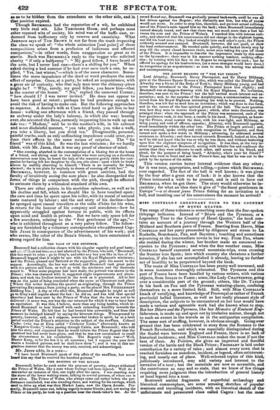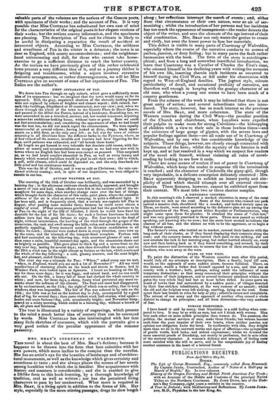MISS COSTELLO 9 LEGENDARY TOUR TO THE COUNTRY OF HENRI
QUATRE.
THE range of these volumes is something more than the fine-spoken titlepage indicates. Instead of "Barn and the Pyrenees, or a Legendary Tour to the Country of Henri Quatre," the book con- tains an account of a journey through the Western half of the Midland and Southern parts of France. Starting from Havre, Miss• COSTELLO and her party proceeded by diligence and steam to La Rochelle, Bourdeaux, Pau, and Bayonne ; touching and sometimes sojourning at the intermediate towns in her way. From Pau, where she resided during the winter, her brother made an autumnal ex- cursion to the Pyrenees ; and when the fine weather came, Miss COSTELLO herself executed several mountain-trips, even crossing the frontier into Spain ; into which country she threatens a further invasion, if she has not accomplished it already, leaving no further act of hostility to be perpetrated beyond the book.
The route of Miss COSTELLO has been pretty well traversed, and in some instances thoroughly exhausted. The Pyrenees and this part of France have been handled by various writers, with various objects, from INGLis to PARIS ; some, like Lady CHATTERTON, going over a considerable part of the ground; others, like Dr. TAYLOR in his book on Pau and the Pyrenean watering-places, confining themselves to a more limited field. Still, with Miss COSTELLO'S knack of versifying, and knowledge of Provençal or rather of French provincial ballad literature, as well as her really pleasant style of description, the subjects to be encountered on her tour would have made a various and agreeable work had she known when to stop. But her Hearn and the Pyrenees, like her Memoirs of Eminent Eng- lishwomen, is made up and spun out by irrelative matter, though not to such an extent in the travels as in the antiquarian compilation. The same sort of stuffing, however, is obvious enough. Going over ground that has been celebrated in story from the Romans to the French Revolution, and which was especially distinguished during the feudal wars between England and France, there is no lack of historical incidents ; and Miss COSTELLO makes the most if not the best of them. At Poitiers, she gives an improved and fanciful version of the battle and the Black Prince; FROISSART is laid under contribution for a variety of tales ; and almost every town that is reached furnishes an anecdote, incident, or legend, often uninterest- ing, and mostly out of place. Well-selected topics of this kind, judiciously introduced, may add variety and interest to the narrative of a tour ; but the materials are now so accessible, and the contrivance so easy and so stale, that we know of few things' requiring more judgment than the introduction of general history or local legend into a tour.
Scattered amidst fragments of superficial archwology and historical commonplace, are some amusing sketches of popular manners and travelling incidents, with an historical sketch of the unfortunate and persecuted class called Cagots : but the most-
valuable parts of the volumes are the notices of the Gascon poets, with specimens of their works ; and the account of Pau. It is very possible that Miss COSTELLO has substituted her own cast of mind for the characteristics of the original poets in her elegant versions of their works ; but the notices convey information, and the specimens are pleasing. The description of Pau and its climate is likely to
i
be useful in dissipating a reputation the result of accident or interested objects. According to Miss COSTELLO, the mildness and steadiness of Pau in the winter is a delusion ; the town is as dear as England, with scanty accommodations ; and the neighbour- hood uninteresting and dull, for those who cannot take horse- exercise to go a sufficient distance to reach the better country. As the notices we have previously given of this rather celebrated town present a very different idea of it, and as a journey thither is fatiguing and troublesome, whilst a sojurn involves extensive domestic arrangements, or rather disarrangements, we will let Miss COSTELLO give an account of some of her experiences of Pau. The Italics are the author's.
FIRST APPEARANCE OF PAU.
We drove into Pau through an ugly suburb, which gave a sufficiently mean idea of its appearance : but we imagined that the town would repay us for its approach. Still, the gray, unpainted shutters of the slovenly-looking houses were not replaced by others of brighter and cleaner aspect : still, ruined, bar- rack-like buildings, dilapidated or ill-constructed, met our slew; and, when we drove through the whole of the town to the Grande Place de Henri Quatre, and paused at the Hotel des Postea, instead of a handsome, flourishing inn, we were astonished to see a wretched, ancient, red, low-roofed tenement, adjoining a somewhat ambitious-looking house, without taste or grace. Here we could not find accommodation; and, considering the appearance of what we bad heard was the best inn, we did not much regret the circumstance. We were equally Unsuccessful at several others ; having looked at dirty, dingy, black apart- ments on a fifth floor, as the only ones left : so full was the town of visitera returning in all directions from the different baths in the Pyrenees, where, as it had rained all the summer, invalids and tourists had been lingering for fine days, until patience was exhausted, and "all betook them borne."
At length we got housed in very tolerable but desolate cold rooms, with fur- Aiture as scanty and accommodations as meagre as we had ever met with in towns where no English face had been seen except en passant. This surprised ns, as we had heard comfort abounded in Pau, as well as every luxury and beauty which wearied travellers would be glad to call their own : add to which, a soft, mild climate, which could be depended on, and the only drawback too little wind and too continuous warmth.
This was the 3d of October, and it was as cold as Christmas; the rain con- tinued without ceasing ; and, in spite of our impatience, we were obliged to email) is our inn.
AUTUMN WEATHER AT PAU.
The morning of the 18th of October rose brilliantly, and was succeeded by a burning day : in the afternoon ominous clouds suddenly appeared, and brought a storm of rain and hail, whose effects were felt in the extreme cold of the at- mosphere for some days, when another change came over the face of things, which brought forth the character of this calm, quiet place, where the excessive stillness of the air is cited as almost wearying, in quite a different light. It has been said, and is frequently cited, that a certain sea-captain left Pau in disgust, after passing some months there, because he could never obtain a capful of wind. If'that anonymous gentleman had had the good fortune to be at Pau on the night of the 23d of October, I think he would have fixed his domicile for the rest of his life there; for such a furious hurricane he could seldom have had the good fortune to enjoy. For four hours in the dead of night, without intermission, the howling of the wind through the gorges of the mountains, the rush and swell among the bills, vales, and across the plains, was perfectly appalling. Every moment seemed to threaten annihilation to all within its reach : chimnies were dashed down in every direction, trees torn up by the roots, and the triumph of the tempest-fiend complete. Furious ruin and bail succeeded on the following day, with occasional gleams of sun ; and then came a calm, beautiful summer-day again, and the mountains shone out as brightly as possible. This gave place to thick fog and a severe frost on the very next day, lasting for several day s; rain then diversified the scene; and on the 29th a wind rose in the night almost as furious as the last, which continued the whole of the day following : a cold, gloomy morrow, and the next bright, hot, and pleasant, ended October. The next day was a triumph for Pau: "When," asked every one we met, di when, in England, would you see such a 1st of November ? " All my vivid recollections of charming strolls on the beach and downs in Sussex, and in Windsor Park, were looked upon as figments. 1 beard no boasting on the 2d, nor for three more days; for it was foggy, and rained hard, and no one could stir out. On the 6th, a heavy fall of snow had clothed the whole country in white ; and now, for three days, a sharp, frosty wind prevented any more re- marks about the softness of the climate. The frost and snow had disappeared, as by enchantment, on the 11th; the night of which was so sultry, that to keep windows shut was impossible. The fair of Pau was ushered in by rain on the 12th ; the 13th was as hot as the hottest day in July, accompanied by a good deal of fog, for several days; then came violent wind, hail-storms, wind again— louder and more furious—fog, cold, occasionally bright; and November disap- peared on a misty morning, which ended in a burning day, without a breath of air, all glare and faintness.
The tour is illustrated by a variety of engravings, which present to the mind a much better idea of scenery than can be conveyed by words. Miss COSTELLO has also intermingled with her text many little sketches of costumes, which with the portraits give a Very good notion of the peculiar appearance of the remoter peasantry.



























 Previous page
Previous page